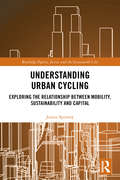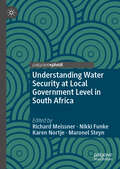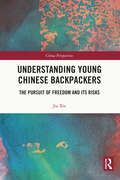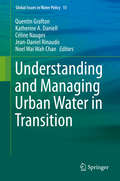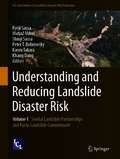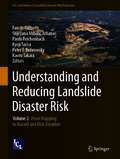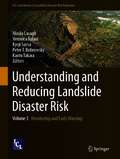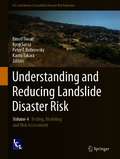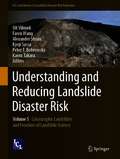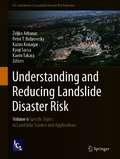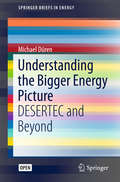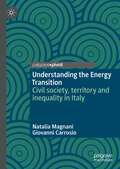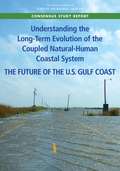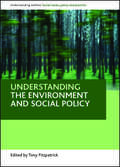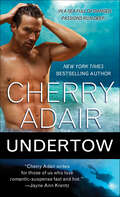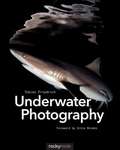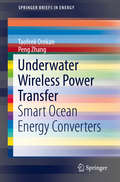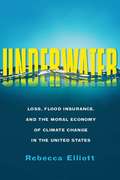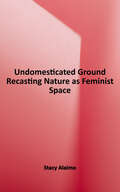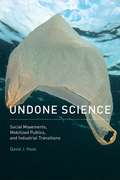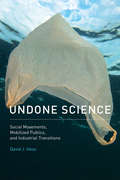- Table View
- List View
Understanding Urban Cycling: Exploring the Relationship Between Mobility, Sustainability and Capital (Routledge Equity, Justice and the Sustainable City series)
by Justin SpinneyAcademic interest in cycling has burgeoned in recent years with significant literature relating to the health and environmental benefits of cycling, the necessity for cycle-specific infrastructure, and the embodied experiences of cycling. Based upon primary research in a variety of contexts such as London, Shanghai and Taipei, this book demonstrates that recent developments in urban cycling policy and practice are closely linked to broader processes of capital accumulation. It argues that cycling is increasingly caught up in discourses around Smart cities that emphasise technological solutions to environmental problems and neoliberal ideas on individual responsibility and biopolitical conduct, which only results in solutions that prioritise those who are already mobile. The central argument of the book is not that the popularisation of cycling is inherently bad, but that the manner in which cycling is being popularised gives cause for social and environmental concern. Ultimately the book argues that cycling has now become a vehicle for sustaining pro-growth agendas rather than subverting them or shifting to sustainable no-growth/de-growth and less technologically driven visions of modernity. This book makes an innovative contribution to the fields of Cycling Studies, Mobilities and Transport and will be of interest to students and academics working in Human Geography, Transport Studies, Urban Studies, Urban Planning, Public Policy, Sociology and Sustainability.
Understanding Water Security at Local Government Level in South Africa
by Richard Meissner Nikki Funke Karen Nortje Maronel SteynThis book provides unique insights into the complex issue of water security in South Africa. Based on qualitative research conducted through face-to-face structured interviews and focus group discussions with individuals, traditional leaders, municipal officials, researchers, businesspeople and farmers in the two local governments – the Sekhukhune District and eThekwini Metropolitan Municipalities – it focuses on the peoples’ understanding of the concept of water security and whether they believe that the municipalities have achieved water security for all. The research is supported by water security-related statistics, particularly those pertaining to water quality and quantity, and an extensive literature review for the concept of water security. In addition to assessing the state of water security in both municipalities, the book presents a new water security definition and typology, and offers valuable recommendations for future research.
Understanding Young Chinese Backpackers: The Pursuit of Freedom and Its Risks (China Perspectives)
by Jia XieAn activity that originated in Western societies, backpacking has gained increasing popularity among Chinese millennials. In a spirit of the ‘search for self’, young Chinese backpackers have sought to display their pursuit of freedom, independence and responsibility within an increasingly individualised society through backpacking. This volume investigates contemporary young Chinese persons’ views on backpacking culture and backpackers. A group of Chinese backpackers are studied using interview and participant observation, and focus groups are conducted to study young professionals’ and university students’ attitudes towards backpacking. The results indicate a profound cultural change along with a degree of division. On the one hand, the backpackers often begin their journey due to a desire to pursue freedom, and use the pursuit as a process of reflexive awareness; on the other hand, the risks of pursuing a freewheeling lifestyle within an individualised society drive the majority of them to return home. The author concludes that this phenomenon is a kind of ‘staged individualism’, describing how Chinese millennials strike a balance between individual interests and wider social obligations. Students and scholars of sociology tourism, and youth culture will be interested in this volume.
Understanding and Managing Urban Water in Transition
by Katherine A. Daniell Jean-Daniel Rinaudo Quentin Grafton Céline Nauges Noel Wai Wah ChanThis book examines changes and transitions in the way water is managed in urban environments. This book originated from a joint French-Australian initiative on water and land management held in Montpellier, France. The book delivers practical insights into urban water management. It links scientific insights of researchers with the practical experiences of urban water practitioners to understand and respond to key trends in how urban water is supplied, treated and consumed. The 51 contributors to the volume provide a range of insights, case studies, summaries and analyses of urban water and from a global perspective. The first section on water supply and sanitation includes case studies from Zimbabwe, France and South Africa, among others. Water demand and water economics are addressed in the second section of the book, with chapters on long-term water demand forecasting, the social determinants of water consumption in Australian cities, a study of water quality and consumption in France, governance and regulation of the urban water sector and more. The third section explores water governance and integrated management, with chapters on water management in Quebec, in the Rotterdam-Rijnmond urban area, in Singapore and in Australia. The final section offers perspectives on challenges and future uncertainties for urban water systems in transition. Collectively, the diverse insights provide an important step forward in response to the challenges of sustainably delivering water safely, efficiently and equitably.
Understanding and Reducing Landslide Disaster Risk: Volume 1 Sendai Landslide Partnerships and Kyoto Landslide Commitment (ICL Contribution to Landslide Disaster Risk Reduction)
by Peter T. Bobrowsky Kyoji Sassa Matjaž Mikoš Khang Dang Kaoru Takara Shinji SassaThis book is a part of ICL new book series “ICL Contribution to Landslide Disaster Risk Reduction” founded in 2019. Peer-reviewed papers submitted to the Fifth World Landslide Forum were published in six volumes of this book series. This book contains the followings:• Four Forum lectures and one award paper• Sendai Landslide Partnerships, Kyoto Landslide Commitment, and International Programme on Landslides.• Landslide-induced tsunamis• Landslides at UNESCO designates sites and contribution from WMO, FAO, and IRDR• Education and Capacity Development for Risk Management and Risk GovernanceProf. Kyoji Sassa is the Founding President and the Secretary-General of International Consortium on Landslides (ICL). He has been the Editor-in-Chief of International Journal Landslides since its foundation in 2004.Prof. Matjaž Mikoš is the Vice President of International Consortium on Landslides and Vice President of Slovenian Academy of Engineering. He is a Professor and Dean of Faculty of Civil and Geodetic Engineering, University of Ljubljana, Slovenia.Dr. Shinji Sassa is Head of Soil Dynamics Group and Research Director of International Research Center for Coastal Disasters, Port and Airport Research Institute, National Institute of Maritime, Port and Aviation Technology, Japan.Prof. Peter Bobrowsky is the President of International Consortium on Landslides. He is a Senior Scientist of Geological Survey of Canada, Ottawa, Canada.Prof. Kaoru Takara is the Executive Director of International Consortium on Landslides. He is a Professor and Dean of Graduate School of Advanced Integrated Studies (GSAIS) in Human Survivability (Shishu-Kan), Kyoto University.Dr. Khang Dang is the Secretary General of the Fifth World Landslide Forum. He also serves as the Research Promotion Officer of ICL and a Lecturer at the University of Science, Vietnam National University, Hanoi.
Understanding and Reducing Landslide Disaster Risk: Volume 2 From Mapping to Hazard and Risk Zonation (ICL Contribution to Landslide Disaster Risk Reduction)
by Peter T. Bobrowsky Kyoji Sassa Fausto Guzzetti Kaoru Takara Snježana Mihalić Arbanas Paola ReichenbachThis book is a part of ICL new book series “ICL Contribution to Landslide Disaster Risk Reduction” founded in 2019. Peer-reviewed papers submitted to the Fifth World Landslide Forum were published in six volumes of this book series. This book contains the followings:• Keynotes• Landslide detection, recognition and mapping• Landslide susceptibility assessment and modelling• Landslide size statistics and temporal modelling• Data and information for landslide disaster mitigation• Vulnerability to landslides of people, communities and the built environmentDr. Fausto Guzzetti is General Director of Office III – Technical and Scientific Activities for Risk Forecasting and Prevention, Department of Civil Protection, Italian Presidency of the Council of Ministers, on leave from the Italian National Research Council.Prof. Snježana Mihalić Arbanas is a Full Professor of the Faculty of Mining, Geology and Petroleum Engineering of the University of Zagreb, Croatia. She is the Chair of ICL Network Committee.Paola Reichenbach is a Senior Researcher of the Research Institute for Geo-Hydrological Protection, an institute of the Italian National Research Council (IRPI-CNR), Perugia, Italy.Prof. Kyoji Sassa is the Founding President and the Secretary-General of the International Consortium on Landslides (ICL). He has been the Editor-in-Chief of International Journal Landslides since its foundation in 2004.Prof. Peter Bobrowsky is the President of the International Consortium on Landslides. He is a Senior Scientist of Geological Survey of Canada, Ottawa, Canada.Prof. Kaoru Takara is the Executive Director of the International Consortium on Landslides. He is a Professor and Dean of Graduate School of Advanced Integrated Studies (GSAIS) in Human Survivability (Shishu-Kan), Kyoto University.
Understanding and Reducing Landslide Disaster Risk: Volume 3 Monitoring and Early Warning (ICL Contribution to Landslide Disaster Risk Reduction)
by Peter T. Bobrowsky Kyoji Sassa Nicola Casagli Kaoru Takara Veronica TofaniThis book is a part of ICL new book series “ICL Contribution to Landslide Disaster Risk Reduction” founded in 2019. Peer-reviewed papers submitted to the Fifth World Landslide Forum were published in six volumes of this book series. This book contains the followings:• One theme lecture and one keynote lecture• Monitoring and remote sensing for landslide risk mitigation, including one keynote lecture• Landslide early warning systems, forecasting models and time prediction of landslidesProf. Nicola Casagli is a Vice President and President-elect of the International Consortium on Landslides (ICL) for 2021–2023. He is Professor of engineering geology at the Department of Earth Sciences, University of Florence, and President of the National Institute of Oceanography and Applied Geophysics – OGS, Trieste, Italy.Dr. Veronica Tofani is an Associate Professor at the Department of Earth Sciences, University of Florence, and Program Coordinator of the UNESCO Chair on Prevention and Sustainable Management of Geo-hydrological hazards, University of Florence.Prof. Kyoji Sassa is the Founding President and the Secretary-General of the International Consortium on Landslides (ICL). He has been the Editor-in-Chief of International Journal Landslides since its foundation in 2004.Prof. Peter Bobrowsky is the President of the International Consortium on Landslides. He is a Senior Scientist of Geological Survey of Canada, Ottawa, Canada.Prof. Kaoru Takara is the Executive Director of the International Consortium on Landslides. He is a Professor and Dean of Graduate School of Advanced Integrated Studies (GSAIS) in Human Survivability (Shishu-Kan), Kyoto University.
Understanding and Reducing Landslide Disaster Risk: Volume 4 Testing, Modeling and Risk Assessment (ICL Contribution to Landslide Disaster Risk Reduction)
by Peter T. Bobrowsky Kyoji Sassa Binod Tiwari Kaoru TakaraThis book is a part of ICL new book series “ICL Contribution to Landslide Disaster Risk Reduction” founded in 2019. Peer-reviewed papers submitted to the Fifth World Landslide Forum were published in six volumes of this book series. This book contains the followings:• Five keynote lectures• Recent development in physical modeling of landslides• Recent development in numerical modeling of landslides• Recent development in soil and rock testing techniques, application and analysis methods• Recent advancements in the methods of slope stability and deformation analyses• Recent development in disaster risk assessmentProf. Binod Tiwari is a Vice President of the International Consortium on Landslides (ICL). He is the Associate Vice President for research and sponsored project and Professor of civil and environmental engineering at the California State University, Fullerton, California, USA.Prof. Kyoji Sassa is the Founding President and the Secretary-General of the International Consortium on Landslides (ICL). He has been the Editor-in-Chief of International Journal Landslides since its foundation in 2004.Prof. Peter Bobrowsky is the President of the International Consortium on Landslides. He is a Senior Scientist of Geological Survey of Canada, Ottawa, Canada.Prof. Kaoru Takara is the Executive Director of the International Consortium on Landslides. He is a Professor and Dean of Graduate School of Advanced Integrated Studies (GSAIS) in Human Survivability (Shishu-Kan), Kyoto University.
Understanding and Reducing Landslide Disaster Risk: Volume 5 Catastrophic Landslides and Frontiers of Landslide Science (ICL Contribution to Landslide Disaster Risk Reduction)
by Peter T. Bobrowsky Fawu Wang Alexander Strom Kyoji Sassa Vít Vilímek Kaoru TakaraThis book is a part of ICL new book series “ICL Contribution to Landslide Disaster Risk Reduction” founded in 2019. Peer-reviewed papers submitted to the Fifth World Landslide Forum were published in six volumes of this book series. This book contains the followings:Part I with topics is mainly about landslides and earthquakes; landslide dams and outburst floods; catastrophic large-scale landslides in mountainous regions.Part II with topics is mainly about impact of climate change; loess landslides; mapping, monitoring and modeling of landslides; stabilization and mitigation; application of new technology in landslide studies.Prof. Vít Vilímek is the vice-president of the International Consortium on Landslides (ICL) and a member of the evaluation committee, Editor-in-Chief of the university journal AUC Geographica and Associate Editor-in-Chief of the international journal Geoenvironmental Disasters. He is a Professor of Physical Geography at Charles University, Prague, Czech Republic.Prof. Fawu Wang is the President of the International Consortium on Geo-disaster Reduction (ICGdR) and the Editor-in-Chief of the international journal Geoenvironmental Disasters. He is a Professor at the School of Civil Engineering, Tongji University, China.Dr. Alexander Strom is a chief expert at the Geodynamics Research Center LLC, Moscow, Russia. He is also an Adjunct Professor at Chang’an University, Xi’an, China, Visiting Professor at SKLGP, Chengdu, China, and an alternative representative of the JSC “Hydroproject Institute” in ICL.Prof. Kyoji Sassa is the Founding President and the Secretary-General of the International Consortium on Landslides (ICL). He has been the Editor-in-Chief of International Journal Landslides since its foundation in 2004.Prof. Peter Bobrowsky is the President of the International Consortium on Landslides. He is a Senior Scientist of Geological Survey of Canada, Ottawa, Canada.Prof. Kaoru Takara is the Executive Director of the International Consortium on Landslides. He is a Professor and Dean of Graduate School of Advanced Integrated Studies (GSAIS) in Human Survivability (Shishu-Kan), Kyoto University.
Understanding and Reducing Landslide Disaster Risk: Volume 6 Specific Topics in Landslide Science and Applications (ICL Contribution to Landslide Disaster Risk Reduction)
by Peter T. Bobrowsky Kyoji Sassa Željko Arbanas Kaoru Takara Kazuo KonagaiThis book is a part of ICL new book series “ICL Contribution to Landslide Disaster Risk Reduction” founded in 2019. Peer-reviewed papers submitted to the Fifth World Landslide Forum were published in six volumes of this book series. This book contains the following parts:• Impact of Large Ground Deformations near Seismic Faults on Critically Important Civil Infrastructures• Recent Progress in the Landslide Initiating Science• Earth Observation and Machine Learning in Landslide Science• General Landslide StudiesProfessor Željko Arbanas is the Vice President of International Consortium on Landslides. He is a Professor of Faculty of Civil Engineering, University of Rijeka, Croatia. He is the Assistant Editor-in-Chief of International Journal Landslides.Professor Peter Bobrowsky is the President of International Consortium on Landslides. He is a Senior Scientist of Geological Survey of Canada, Ottawa, Canada.Professor Kazuo Konagai is Professor Emeritus at the University of Tokyo and Principal Researcher at the ICL Headquarters. He serves as the Secretary-General of the Fifth World Landslide Forum.Professor Kyoji Sassa is the Founding President and the Secretary-General of the International Consortium on Landslides (ICL). He has been the Editor-in-Chief of International Journal Landslides since its foundation in 2004.Professor Kaoru Takara is the Executive Director of International Consortium on Landslides. He is a Professor and Dean of Graduate School of Advanced Integrated Studies (GSAIS) in Human Survivability (Shishu-Kan), Kyoto University.
Understanding the Bigger Energy Picture: DESERTEC and Beyond (SpringerBriefs in Energy)
by Michael DürenThis book is open access under a CC BY 4.0 license.This book focuses on the global cycles of energy, water and carbon, which are not only the essentials of our main energy carriers, the fossil fuels, but are also the building blocks of life. The book offers an overview of the basic scientific facts and relationships that are needed to understand today’s energy generation and use, how they relate to global climate, the water cycle and other resources, and the complexities of energy policy. Building on the work of the Desertec project, it presents the main technological options that we will have in a world after the “Energiewende” and presents the possible future solutions for a sustainable world. The book is written in an engaging, descriptive style that can be understood by those without specific knowledge of science or economics and allows readers to form their own conclusions. Controversy rages over energy problems, climate change and their possible solutions. Expressions like “climate deniers”, “renaissance of nuclear energy”, “stop the war on coal”, and “Energiewende now” represent a diversity of opinions that divide our society and political leaders. This book shows the reader the whole energy picture and how it is part of the wider global problems of overpopulation and uncontrolled economies in a world of limited resources.
Understanding the Energy Transition: Civil society, territory and inequality in Italy
by Natalia Magnani Giovanni CarrosioThe transformation of the dominant model of centralized energy production from fossil fuels to renewable energies is at the center of the public and scientific debate, as well as the subject of national and European policies, as it is connected to highly topical issues such as climate change, emissions reduction and natural disasters, security of supply and sustainability of the current economic development model.Up to now this topic has been mainly addressed by the economic and engineering sciences, with a research focus on the hardware rather than on the human and social software.However, energy systems, and the possibilities of change, are not only economic or technological but involve also patterns of social life, representations, organizational models and relational structures. In order to generate the social preconditions for the transition to a low-emission society, focused on a growing production of energy from renewable sources and on a greater sustainability of consumption, it is therefore urgent to reaffirm the centrality of a sociological approach to energy.This book focused on three core research areas which are crucial to understand what is at stake with the energy transition: conflicts over the construction and location of renewable energy production plants; collective action on renewable sources that promote a new model of energy system in which consumers are also producers; and the social-territorial impact of energy policies.
Understanding the Long-Term Evolution of the Coupled Natural-Human Coastal System: The Future Of The U. S. Gulf Coast
by Engineering Medicine National Academies of SciencesThe U.S. Gulf Coast provides a valuable setting to study deeply connected natural and human interactions and feedbacks that have led to a complex, interconnected coastal system. The physical landscape in the region has changed significantly due to broad-scale, long-term processes such as coastal subsidence and river sediment deposition as well as short-term episodic events such as hurricanes. Modifications from human activities, including building levees and canals and constructing buildings and roads, have left their own imprint on the natural landscape. This coupled natural-human coastal system and the individual aspects within it (physical, ecological, and human) are under increased pressure from accelerating environmental stressors such as sea level rise, intensifying hurricanes, and continued population increase with its accompanying coastal development. Promoting the resilience and maintaining the habitability of the Gulf Coast into the future will need improved understanding of the coupled natural-human coastal system, as well as effective sharing of this understanding in support of decision-making and policies. Understanding the Long-term Evolution of the Coupled Natural-Human Coastal System presents a research agenda meant to enable a better understanding of the multiple and interconnected factors that influence long-term processes along the Gulf Coast. This report identifies scientific and technical gaps in understanding the interactions and feedbacks between human and natural processes, defines essential components of a research and development program in response to the identified gaps, and develops priorities for critical areas of research.
Understanding the environment and social policy (Understanding Welfare: Social Issues, Policy and Practice)
by Tony FitzpatrickBringing together leading experts, this textbook explores the key social, political, economic and moral challenges that environmental problems pose for social policy in a global context. Combining theory and practice with an interdisciplinary approach, the book reviews the current strategies and policies and provides a critique of proposed future developments in the field. Understanding the environment and social policy guides the reader through the subject in an accessible way using chapter summaries, further reading, recommended webpages, a glossary and questions for discussion. Providing a much-needed overview, the book will be invaluable reading for students, teachers, activists, practitioners and policymakers.
Undertow (Cutter Cay #1)
by Cherry AdairThe New York Times–bestselling author “returns to her romantic suspense roots with an underwater treasure hunt that is thrilling and hazardous!” (Romantic Times, 4.5 stars)She takes the plunge.Teal Williams is content with her career as a ship’s master mechanic—until Zane Cutter, the “Casanova of the Caribbean,” makes her an offer she can’t refuse: to climb on board with him for a real-life treasure hunt. Teal must help him dredge up a shipwrecked vessel containing an abundance of gold, silver, and emeralds—and she’ll claim part of the prize.He’s blown off course.Zane needs a mechanic—not a lover—and Teal, who can also dive, is perfect for the job. So it suits him just fine that Teal is completely immune to his charms . . . or so he tells himself. But with a deadly enemy in their midst—one who’s silently edging closer—Zane and Teal sink into troubled waters. Trapped in the middle of a perilous sea, they have no one to turn to but each other as they face down a danger that runs unfathomably deep—and a passion that runs even deeper . . .“Undertow is the beginning of an exciting and witty new series enriched with fun characters and action-packed drama. I literally could not put it down!” —Fresh Fiction“Grips readers and never slows down as the protagonists struggle with perils including to their hearts with every nautical mile they sail. Fast-paced, Cherry Adair opens her Cutter Salvage series with a strong sea saga.” —Genre Go Round Reviews
Underwater Art (Fountas & Pinnell Classroom, Guided Reading Grade 4)
by Jacqueline AdamsART TO THE RESCUE One of the largest coral reef systems in the world was in danger of being damaged beyond repair. The solution? A unique museum, dreamed up by an environmentalist, a businessman, and an artist, all working together. NIMAC-sourced textbook
Underwater Dogs
by Seth CasteelThe exuberant, exhilarating photographs of dogs underwater that have become a sensationFrom the water's surface, it's a simple exercise: a dog's leap, a splash, and then a wet head surfacing with a ball, triumphant. But beneath the water is a chaotic ballet of bared teeth and bubbles, paddling paws, fur and ears billowing in the currents. From leaping lab to diving dachshund, the water is where a dog's distinct personality shines through; some lounge in the current, paddling slowly, but others arch their bodies to cut through the water with the focus and determination of a shark. In more than eighty portraits by award-winning pet photographer and animal rights activist Seth Casteel capture new sides of our old friends with vibrant underwater photography that makes it impossible to look away. Each image bubbles with exuberance and life, a striking reminder that even in the most loveable and domesticated dog, there are more primal forces at work. In Underwater Dogs, Seth Casteel gives playful and energetic testament to the rough-and-tumble joy that our dogs bring into our lives.
Underwater Photography
by Tobias FriedrichUnderwater photography is a fascinating pursuit for those who aspire to capture the magical world found within our oceans and bring it to the surface. In this book, award-winning photographer Tobias Friedrich teaches us how to create stunning underwater images, covering everything from the equipment needed, to creating powerful compositions, to processing the final image. He uses case studies to show how his own images were created, and provides detailed explanations for specific techniques that can be applied to your very next dive.The text is supported by images from some of the most beautiful diving areas on Earth. Also included are countless tips and tricks for the beginner and intermediate photographer.Topics include:Choosing the right equipmentComposing your imagesWide-angle photographyMacro photographyImage editingCase studiesDiagrams of shooting positionsAn added bonus is the 22-page Guest Gallery featuring images by some of today's most recognized names in underwater photography, including Ernie Brooks, Alex Mustard, Richard Salas, Imran Ahmad, and Eric Cheng.The abundance of breathtaking underwater images contained in this book is sure to inspire you to plan your next dive.Foreword by Ernie Brooks.
Underwater Puppies
by Seth CasteelNew York Times bestselling author and photographer Seth Casteel's follow-up to the phenomenal Underwater Dogs -- now with puppies.The world fell in love with swimming canines in Seth Casteel's first book, Underwater Dogs. Now, in more than 80 previously unpublished portraits of underwater puppies, we see man's best friends at their most playful and exuberant. Each vibrant and colorful underwater image shows off the wild and sublime range of emotions of puppies, cute and irresistible to the very last.
Underwater Wireless Power Transfer: Smart Ocean Energy Converters (SpringerBriefs in Energy)
by Peng Zhang Taofeek OrekanThis book discusses, for the first time, wireless power transfer in the ocean environment. Topics covered include power electronic techniques, advanced control strategies, as well as classic and emerging applications such as smart ocean energy systems and wireless power transfer and charging of underwater autonomous vehicles. Emerging research topics are presented, along with methodologies, approaches, and industrial development of intelligent and energy-efficient techniques. Apart from the basic principles with an emphasis on inductive power transfer and mathematical analysis, the book discusses the emerging implementation for underwater wireless power transfer such as energy encryption, power and data transfer through common links, and secured data- and cyber-security. Specifically, the book comprehensively introduces significant discussions on UWPT coil theoretical and experimental analysis in seawater, optimal design, and intelligent controls. For example, since fast communication is not viable in an underwater environment, the proposed book discusses Maximum Power Efficiency Tracking (MPET) control, which achieves a maximum power efficiency (>85%) without communication or feedback from the transmitting side of the UWPT system. A k-nearest-neighbors-based machine learning approach is used to estimate the coupling coefficiency between the coils. This machine learning-based intelligent control method can offer important guidance for graduate students, academic researchers, and industrial engineers who want to understand the working principles and realize the developing trends in underwater wireless power transfer. Finally, the book includes details on the modeling and design of a smart ocean energy system--a new type of power harvesting system designed to convert ocean energy into electricity, which has the capability of making underwater wireless power connections with distributed marine devices.
Underwater: Loss, Flood Insurance, and the Moral Economy of Climate Change in the United States (Society and the Environment)
by Rebecca ElliottCommunities around the United States face the threat of being underwater. This is not only a matter of rising waters reaching the doorstep. It is also the threat of being financially underwater, owning assets worth less than the money borrowed to obtain them. Many areas around the country may become economically uninhabitable before they become physically unlivable.In Underwater, Rebecca Elliott explores how families, communities, and governments confront problems of loss as the climate changes. She offers the first in-depth account of the politics and social effects of the U.S. National Flood Insurance Program (NFIP), which provides flood insurance protection for virtually all homes and small businesses that require it. In doing so, the NFIP turns the risk of flooding into an immediate economic reality, shaping who lives on the waterfront, on what terms, and at what cost.Drawing on archival, interview, ethnographic, and other documentary data, Elliott follows controversies over the NFIP from its establishment in the 1960s to the present, from local backlash over flood maps to Congressional debates over insurance reform. Though flood insurance is often portrayed as a rational solution for managing risk, it has ignited recurring fights over what is fair and valuable, what needs protecting and what should be let go, who deserves assistance and on what terms, and whose expectations of future losses are used to govern the present. An incisive and comprehensive consideration of the fundamental dilemmas of moral economy underlying insurance, Underwater sheds new light on how Americans cope with loss as the water rises.
Undomesticated Ground: Recasting Nature As Feminist Space
by Stacy AlaimoFrom "Mother Earth" to "Mother Nature," women have for centuries been associated with nature. Feminists, troubled by the way in which such representations show women controlled by powerful natural forces and confined to domestic space, have sought to distance themselves from nature. In Undomesticated Ground, Stacy Alaimo issues a bold call to reclaim nature as a feminist space. Her analysis of a remarkable range of feminist writings-as well as of popular journalism, visual arts, television, and film-powerfully demonstrates that nature has been and continues to be an essential concept for feminist theory and practice. Alaimo urges feminist theorists to rethink the concept of nature by probing the vastly different meanings that it carries. She discusses its significance for Americans engaged in social and political struggles from, for example, the "Indian Wars" of the early nineteenth century, to the birth control movement in the 1920s, to contemporary battles against racism and heterosexism. Reading works by Catherine Sedgwick, Mary Austin, Emma Goldman, Nella Larson, Donna Haraway, Toni Morrison, and others, Alaimo finds that some of these writers strategically invoke nature for feminist purposes while others cast nature as a postmodern agent of resistance in the service of both environmentalism and the women's movement. By examining the importance of nature within literary and political texts, this book greatly expands the parameters of the nature writing genre and establishes nature as a crucial site for the cultural work of feminism.
Undone Science: Social Movements, Mobilized Publics, and Industrial Transitions
by David J. HessAs the fields of social movement studies (SMS) and science and technology studies (STS) have diversified in topical focus, they have moved closer to each other. SMS has turned toward the study of nonstate targets and institutionalized repertoires of action, just as STS has turned to expertise and publics. In Undone Science, David Hess argues that a theoretical integration of core concepts in the two fields is now possible, and he presents just such a synthesis. Hess focuses on industrial transition movements -- mobilized counterpublics of activists, advocates, entrepreneurs, and other agents of change -- and examines several areas of common ground between the two fields relevant to these movements. His account reveals the problem of "undone science" -- areas of research potentially valuable to the goals of industrial transition movements that have been systematically ignored. Each chapter begins with a problem in SMS, discusses the relevant STS literature, describes new concepts and findings that have emerged, and offers applications to examples that range from nanotechnology and climate science denialism to conflicts based on race, class, and gender. Topics include the epistemic dimension of the political opportunity structure, networks of counterpublic knowledge, and regime resistance in industrial transition.
Undone Science: Social Movements, Mobilized Publics, and Industrial Transitions (The\mit Press Ser.)
by David J. HessA theoretical integration of science and technology studies and social movement studies that finds both common ground and “undone” research.As the fields of social movement studies (SMS) and science and technology studies (STS) have diversified in topical focus, they have moved closer to each other. SMS has turned toward the study of nonstate targets and institutionalized repertoires of action, just as STS has turned to expertise and publics. In Undone Science, David Hess argues that a theoretical integration of core concepts in the two fields is now possible, and he presents just such a synthesis. Hess focuses on industrial transition movements—mobilized counterpublics of activists, advocates, entrepreneurs, and other agents of change—and examines several areas of common ground between the two fields relevant to these movements. His account reveals the problem of “undone science”—areas of research potentially valuable to the goals of industrial transition movements that have been systematically ignored. Each chapter begins with a problem in SMS, discusses the relevant STS literature, describes new concepts and findings that have emerged, and offers applications to examples that range from nanotechnology and climate science denialism to conflicts based on race, class, and gender. Topics include the epistemic dimension of the political opportunity structure, networks of counterpublic knowledge, and regime resistance in industrial transition.
Une année avec Mélissa
by Alessandro Caselli Marzia BosoniRespect de l'environnement, des animaux et de nous-mêmes: voilà ce dont traitent les dialogues entre Melissa, une fillette de six ans désireuse de comprendre le monde, et Monsieur Chat, un chat vagabond rusé. Six histoires pour raconter un an de la vie de la petite fille et pour partager un peu de la sagesse que le chat a accumulée sur les routes du monde. Entre deux récits, le chat s’adresse aux parents et aux adultes en général pour leur demander de s’arrêter un instant et réfléchir à des questions importantes comme l’écologie, la pollution, la douleur et l’amitié. Un livre pour enfants mais aussi un livre pour les adultes qui savent encore trouver le temps de parler avec leurs enfants. Et avec les chats.
